Much has been written about the current revival of Arthur Miller's Tony Award and Pulitzer Prize-winning classic Death of a Salesman. There have been raves and sniping. Many have written that Philip Seymour Hoffman and Linda Emond are much too young to be playing Willy and Linda, that Andrew Garfield, in his Bway debut, isn't the physical specimen Miller describes Biff to be. They may not be; however, they're certainly playing Willy, Linda, and Biff superbly.
Under Mike Nichols direction and the spell of Miller's powerful and emotional work, Hoffman, Emond, and Garfield make you believe who they're suppose to be. That age and physical thing is only a momentary distraction. And let's not forget Finn Wittrock, whom many say is too old to be playing Happy. But he certainly plays "young" well."
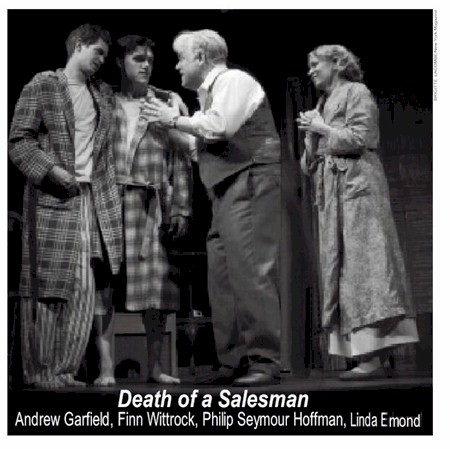 Hoffman displays a cockiness, self-pity and anger that quakes the stage. Garfield inhabits Biff to the nth degree - charming, boastful, All-American, then deflated - and stuns in a shattering performance. Emond, walking on eggshells through Willy's abuse as she tries to keep their house of cards from crumbling, is full of quiet dignity. Her climatic moments at Willy's grave are so understated and yet so devastating that even the phone ringing at rear orchestra left with the piercing loudness of an oompah band couldn't destroy her moment.
Hoffman displays a cockiness, self-pity and anger that quakes the stage. Garfield inhabits Biff to the nth degree - charming, boastful, All-American, then deflated - and stuns in a shattering performance. Emond, walking on eggshells through Willy's abuse as she tries to keep their house of cards from crumbling, is full of quiet dignity. Her climatic moments at Willy's grave are so understated and yet so devastating that even the phone ringing at rear orchestra left with the piercing loudness of an oompah band couldn't destroy her moment.
These are performances that should be celebrated. And Miller's words and his story arc are so powerful that when the curtain came down more than a few audience members were in tears - one seemingly in the throes of a breakdown, and couldn't even get up from their seats.
This is what great theater is all about.
Elia Kazan on the Power of Miller's Play
An excerpt from Elia Kazan: A Life [1988] ~
"Of all the plays I've directed, Death of a Salesman is my favorite. When I read it again recently, it hit me as hard as it had when I read it the first time, 38 years ago - just as hard and in the same place, immediately, on Page Two! I am a man who has trained himself to let no pain show, but I felt tears coming as I turned that page. I suppose the play revives the memory, long at rest, of my father, a salesman of another product, of his hopes for his sons in this new country and the gently twisted Anatolian smile on his face ... That and more from those years of my life, as well as other memories, without words or face, lying in wait with their burden of sadness, swarmed up when I read that damned disturbing play last week, just as they had when Art Miller, the day after he finished it in 1948, gave it to me ... 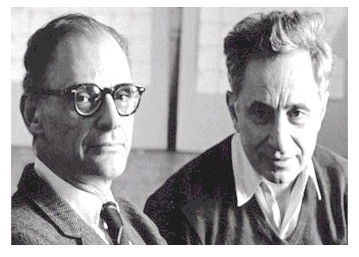 I didn't wait for the next morning to see if I'd have a more 'balanced' judgment ... but called Art ... and told him his play had 'killed' me. 'I wrote it in eight weeks,' he replied ...
I didn't wait for the next morning to see if I'd have a more 'balanced' judgment ... but called Art ... and told him his play had 'killed' me. 'I wrote it in eight weeks,' he replied ...
[Art] shows us a man who represents everything he believes to be misguided about the system we live in, then goes on to make us feel affection and concern, pity and even love for this man. Then he goes deeper and we are away of a tragic weight. Is it for the Salesman? Is it for ourselves? And along with arousing the sympathetic pain, his horrendous here is able to make us laugh. He is ridiculous and he is tragic all at once. How is that accomplished? I don't know any other play in any other language that does all these things at the same time. But Arthur Miller did them all -that one time and never again ...
Art had not judged Willy Loman, he'd permitted Will's acts to pronounce final judgment. He loved the Salesman he was condemning. He didn't offer a final answer except the one life gives to a sensitive man: 'How bewildering! How funny! How terrible! How noble! How tragic!"
California Dreaming with a Dream Cast
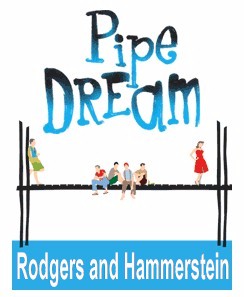 City Center Encores! is presenting the last concert performances of Rodgers and Hammerstein's rarely revived [first time in 20 years]1955 musical Pipe Dream, based on John Steinbeck's Cannery Row and Sweet Thursday and set in a Monterey County, California seaside town. Remaining performances are tonight @ 8, Saturday @ 2 and 8, and Sunday @ 2 and 7.
City Center Encores! is presenting the last concert performances of Rodgers and Hammerstein's rarely revived [first time in 20 years]1955 musical Pipe Dream, based on John Steinbeck's Cannery Row and Sweet Thursday and set in a Monterey County, California seaside town. Remaining performances are tonight @ 8, Saturday @ 2 and 8, and Sunday @ 2 and 7.
Someone recently asked, "When do you suppose there'll be a musical adaptation of CSI?" Anything is possible. Jerry Herman did it with Madwoman...; Sondheim, with Sweeney Todd and Assassins. Rodgers and Hammerstein did it with Pipe Dream, which is second-tier R&H, proven by the fact the original ran only 246 performances. It's dated, but has some laughs and several good tunes. You hear echoes of South Pacific, even a similarity or two to it; and chords of The Sound of Music, which was yet to come.
One of Encores! goals is to showcase the forgotten and they certainly showcased this one expertly. There are excellent voices, very good choreography, and how can you bet the sound of that 30-piece orchestra?
The 30-strong cast is headlined by Leslie Uggams, Laura Osnes, Will Chase, Tom Wopat, and Stephen Wallem. Directing is Marc Bruni with music direction by Rob Berman. Choreography is by Kelli Barclay. The wistful score includes "All Kinds of People," "Everybody's Got a Home but Me," "The Man I Used to Be,"
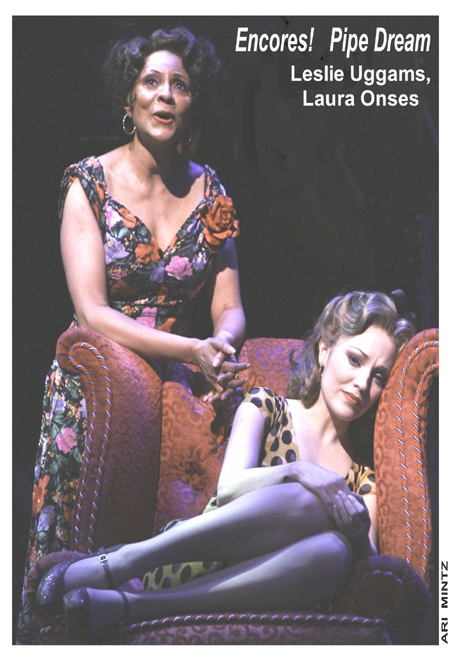 The story concerns a homeless drifter who lands herself among out of work fisheries men living in a flophouse with a feisty madam [Uggams, in quite a departure role] and her gals, seemingly, across the street. Romance, of course, develops: between Suzy [Osnes], who eventually takes up residence, if you can believe this, in a former boiler, and Doc [Chase], a marine biologist.
The story concerns a homeless drifter who lands herself among out of work fisheries men living in a flophouse with a feisty madam [Uggams, in quite a departure role] and her gals, seemingly, across the street. Romance, of course, develops: between Suzy [Osnes], who eventually takes up residence, if you can believe this, in a former boiler, and Doc [Chase], a marine biologist.The esteemed Harold Clurman directed the original,which starred William Johnson [Kismet, The Vagabond King; Tony nom'd for his Doc]; Judy Tyler [Tony nom'd in her only Bway role; but who made TV history as Princess Summerfall Winterspringon on The Howdy Doody Show]; Mike Kellin as Hazel [Rhinoceros, Mother Courage...; also Tony nom'd and a later Oscar in the long-running Odd Couple]; with Met star Helen Traubel making her Bway debut as Fauna.
If you're in attendance this weekend, you may actually be on Encores! first ever live cast recording. Pipe Dream is scheduled for release this summer on Ghostlight Records.
Tkts are $25 - $115 and available at City Center's box office, through CityTix (212) 581-1212, or at
An Exploration of One Composer's Lasting Impact
From his patriotic "God Bless America" to his wistful "White Christmas," probably one of the most recorded and most heard tune of all time, Irving Berlin's songs have long accompanied folks everywhere as they dream, fall in love, go to war, and come home from near or far for the holidays. Jeffrey Magee's excellent Irving Berlin's American Musical Theater [Oxford University Press; hardcover, 408 pages, 30 + photographs, 125 + music samples; Source notes; Index; SRP $35; Amazon Kindle, $15] is the first book to fully consider Berlin's immeasurable influence on music and the stage.  An award-winning music historian, Magee chronicles Berlin's theatrical career, providing a rich background to some of the great composer's most enduring songs, among the many "There's No Business Like Show Business," "Alexander's Ragtime Band," "Blue Skies," "Always," "What'll I Do," "Puttin' on the Ritz, "God Bless America" and the great theater scores, such as the classic Annie Get Your Gun. In addition, there're illustrations of never-before-seen sheet music and archival treasures.
An award-winning music historian, Magee chronicles Berlin's theatrical career, providing a rich background to some of the great composer's most enduring songs, among the many "There's No Business Like Show Business," "Alexander's Ragtime Band," "Blue Skies," "Always," "What'll I Do," "Puttin' on the Ritz, "God Bless America" and the great theater scores, such as the classic Annie Get Your Gun. In addition, there're illustrations of never-before-seen sheet music and archival treasures.
Magee recalls Berlin's early years singing for pennies and his development as a pianist/tunesmith who transformed American music and the Bway stage becoming one of our most beloved composers. He also looks at darker aspects of Berlin's life, examining the anti-Semitism he faced and his later struggle with depression.
[Trivia: Often when he was in a funk, his wife Ellin would call Anita Gillette (currently, Lortel-nom'd in The Big Meal; soon to repeat her show at Birdland), who co-starred in Berlin's 1962 short-lived Mr. President, and request that she come over and serenade the maestro.]
Irving Berlin's American Musical Theater is informative, detailed, entertaining, provocative, and a must for theater and music aficionados.
A Golden Voice We'll Long Remember
The world of classical music and opera was robbed much too soon of a true spinto voice when tenor Salvatore Licitra was killed in 2011 at 43. His voice soared with warmth and heroic breadth. In tribute, there's quite a comprehensive two-disc collection of his music, The Best of Salvatore Licitra [Sony Classical].  Licitra possessed irrepressible vitality and generous spirit, as he emulated his idols - from Caruso and Gigli to di Stefano, Domingo, and Pavarotti. The 20 tracks - five previously unreleased - showcase arias from Giordano, Leoncavallo, Mascagni, Ponchielli, Puccini, and Verdi, as well as Italian songs recorded with Marco Armilliato and the Prague Philharmonic.
Licitra possessed irrepressible vitality and generous spirit, as he emulated his idols - from Caruso and Gigli to di Stefano, Domingo, and Pavarotti. The 20 tracks - five previously unreleased - showcase arias from Giordano, Leoncavallo, Mascagni, Ponchielli, Puccini, and Verdi, as well as Italian songs recorded with Marco Armilliato and the Prague Philharmonic.
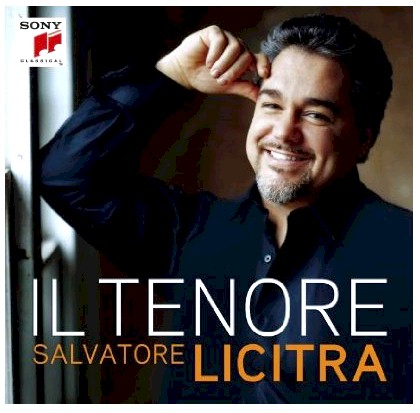 In May 2002, Licitra made a spectacular leap to stardom when he stepped in for Pavarotti at the 11th hour in a Met performance of Tosca. The evening segued from sheer disappointment to thunderous applause. NYTimes critic Anthony Tommasini hailed him as "a star-is-born triumph." Licitra went on to acclaim in the world's most prestigious opera houses. Amazingly, in his last two seasons, he starred at the Met, La Scala, and in Chicago, San Francisco, Washington, Verona, Rome, Florence, Palermo, and Vienna.
In May 2002, Licitra made a spectacular leap to stardom when he stepped in for Pavarotti at the 11th hour in a Met performance of Tosca. The evening segued from sheer disappointment to thunderous applause. NYTimes critic Anthony Tommasini hailed him as "a star-is-born triumph." Licitra went on to acclaim in the world's most prestigious opera houses. Amazingly, in his last two seasons, he starred at the Met, La Scala, and in Chicago, San Francisco, Washington, Verona, Rome, Florence, Palermo, and Vienna.
Last August, Licitra sustained a cerebral hemorrhage when he crashed his motor scooter into a wall near Ragusa, Sicily.
Collection highlights: "Nessun Dorma!" (Turandot), "Vesti la Giubba" (Pagliacci), "La Paterna Mano" (Macbeth), "Addio, Fiorito Asil" (Madama Butterfly), "Dio, Mi Potevi Scagliar" (Otello), "Mamma, Quel Vino è Generoso" (Cavalleria Rusticana), "Celeste Aida" (Aida), "Donna Non Vidi Mai" (Manon Lescaut), three arias from Il Trovatore [two with Ernesto Gavazzi and Barbara Frittoli], five from Tosca, two from Un Ballo in Maschera [one with Mary Plazas], and seven duets with Marcelo Alvarez including "Au Fond du Temple Saint" (Les Pêcheurs de Perles).
A Salute to the Ultimate Dance Legend
A lineup of dance and theater talent honors legendary Capezio shoemakers as it celebrates 125 years on April 23 @ 7 at City Center. Conceived and directed by former Joffrey Ballet star, producer, director, and choreographer Ann Marie DeAngelo, Capezio's 125th Anniversary Award, benefiting the Dizzy Feet Foundation, will be bestowed on Nigel Lythgoe, former dancer, choreographer, TV and film director, and producer of American Idol, and exec producer of So You Think You Can Dance. The 61st annual Capezio Dance Award will also be given.
Ann Reinking, dance great Desmond Richardson, performers from ABT, NYCBallet, Cirque du Soleil, Noah Racey and the NY Song and Dance Company, Mark Stuart Dance Theater, MOMIX, Iluminate, Bad Boys of Dance, Dance Sport Ballroom, Industrial Rhythm, Mr. Wiggles, and, among many others, the World Cup All Stars Cheerleaders will be featured. M.D. will be Jim Morgan.
Italian-born Salvatore Capezio at 17 opened his shop near the old Metropolitan Opera. Anna Pavlova purchased pointe shoes for her company during their first U.S. tour and business soared. Capezio entrusted his shoemaking techniques to family and Capezio products are still dancing across Broadway.
Tkts are $45 - $90 and available at the City Center box office, CITYTIX at (212) 581-1212, or www.nycitycenter.org. P
She's Coming Back and with a Roster of Hits
Irrespressible, indefatigible Marilym Maye returns to Feinstein's at Loews Regency April 24-May 5 with The Happiest Sound in Town. The acclaimed, much honored Miss Maye will be celebrating her 84th birthday, kicking those legs higher than ever!, and singing her most-requested songs. Billy Stritch will be M.D. Fill out your song card because no one does it better. Reserve early: (212) 339-4095.
Titanic: Take the Voyage in 3-D
The iceberg hits theatres April 4 and it's going to be a whopper. This time around, 15 years later, you'll be taking the maiden voyage of the Titanic in 3-D with the option of also seeing it bigger than ever on IMAX screens
Titanic [Paramount/20th Century-Fox], winner of 10 Oscars, including Picture, Director, Cinematography, Costumes, Editing, and Score; and four Golden Globes for Picture, Director, Score, and Song. It stars Leonardo DiCaprio, Kate Winselt, Billy Zane, Kathy Bates, Victor Garber, Frances Fisher, and Gloria Stuart. Winslet and Stuart were Oscar-nom'd. DiCaprio, Winslet, and Stuart were GG nom'd.
The remastered original Titanic soundtrack [Sony Classical] is being released in an anniversary edition with extensive bonus material, including an unreleased disc of period music recorded by I Salonisti, the five-piece quintet that appears in the film.
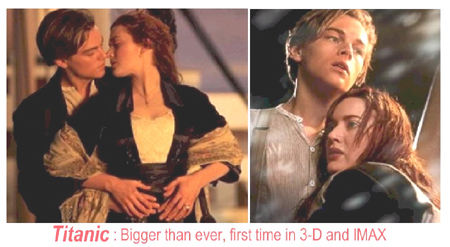 3-D has had a large stigma to the more gimmicky side of filmmaking, its almost always been used as a means to project audacious objects into your face instead of being used, as was done so well in Hugo and the dance doc Pena, to magically immerse audiences in a story. While it might have been more entertaining to have some spectacular 3-D sequences, Cameron doesn't abuse the technology.
3-D has had a large stigma to the more gimmicky side of filmmaking, its almost always been used as a means to project audacious objects into your face instead of being used, as was done so well in Hugo and the dance doc Pena, to magically immerse audiences in a story. While it might have been more entertaining to have some spectacular 3-D sequences, Cameron doesn't abuse the technology.
The three-hour-plus film, a lavish $200-million spectacular and old-fashioned melodrama, returns to help commemorate the 100th Anniversary [April 12] of the fateful voyage. It's not only stunningly filmed and edited, but also well acted and has emotive heft. There're memorable performances by DiCaprio, Winslet, Bates as a delightfully feisty Molly Brown, Frances Farmer as the nose-in-the-air broke Mother on the hunt for a rich husband for her daughter, and Zane as a heartless bastard villain.
Cameron recently reported that when he showed DiCaprio 18 minutes of the converted film, "He cringed, saying 'I'm such a young punk!' He was practically crawling under the seat." If he's embarrassed by his performance, that's an actor's inflated ego talking.
You'll have to be the judge of the 3-D transfer and seeing it for the first time blown up to almost fit the IMAX screen [the real IMAX screens, not this new rip-off, The IMAX Experience!]. Cameron has stated he's not fan of films converted digitally into 3-D. Word from the U.K. premiere is that the deep field of vision shots and a couple of gimmicky moments are done well. It's also been noted that the numerous CCG sequences, even blown sky high, still look fake but hold up.
One review states Cameron has crafted "the best 3D conversion" yet. "To the untrained eye," writes Jamie Slough of WhatCulture.com, "the 3-D effects throughout the opening modern day sequences are on par with those in Avatar...However, this level of quality doesn't last. Once the story reaches the Titanic, a majority of the 3-D shots are unnoticeable with only the occasional brim of a hat or over the shoulder shot to give a level of depth. They eventually become so subtle you could take off the glasses until disaster strikes in full force." Todd McCarthy in Variety had praise: "A spectacular demonstration of what modern technology can contribute to dramatic storytelling."
This is a short featuring James Cameron, courtesy of Paramount:
What the Dickens?
Charles Dicken's Great Expectations, in a two episode/three hour arc on April 1 and 8 @ 9, is the story of Pip [Douglas Booth], the battered orphan boy, who rises from blacksmith's apprentice to gentleman under the patronage of a mysterious benefactor. Gillian Anderson [Miss Havisham], David Suchet, and Ray Winstone star.
 A two-hour adaptation of Dickens' unfinished last novel The Mystery of Edwin Drood airs April 15 @ 9. It's a psychological thriller puzzle about a provincial choirmaster's obsession with 17-year-old Rosa Bud. Matthew Rhys and Julia MacKenzie co-star.
A two-hour adaptation of Dickens' unfinished last novel The Mystery of Edwin Drood airs April 15 @ 9. It's a psychological thriller puzzle about a provincial choirmaster's obsession with 17-year-old Rosa Bud. Matthew Rhys and Julia MacKenzie co-star.
New to DVD
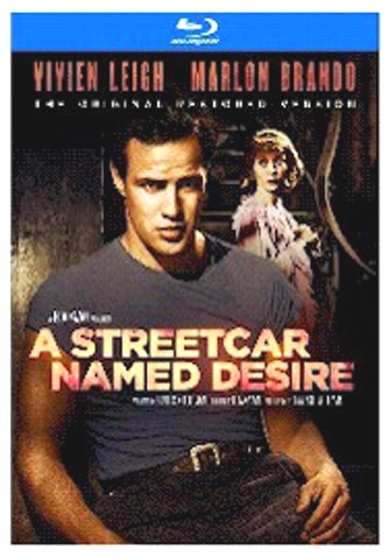 The 60th Anniversary deluxe Blu-ray release of the award-winning film adaption of Tennessee Williams' A Streetcar Named Desire [Warner Home Video; SRP $35], remastered B&W in its original restored version [still quite sanitized], directed by Elia Kazan and starring Marlong Brando and Vivien Leigh, Kim Hunter, and Karl Malden.
The 60th Anniversary deluxe Blu-ray release of the award-winning film adaption of Tennessee Williams' A Streetcar Named Desire [Warner Home Video; SRP $35], remastered B&W in its original restored version [still quite sanitized], directed by Elia Kazan and starring Marlong Brando and Vivien Leigh, Kim Hunter, and Karl Malden.
The film, which features Alex North's evocative jazz score, was nom'd for 12 Oscars, including Picture, and won four - including Actress [Leigh] and Featured Actor [Malden]. Brando's electrifying turn as animalistic Stanley Kowalski was nom'd. The package comes as a 40-page book with photos and film facts. Bonus features: outtakes, Brando screen test, feature doc Elia Kazan: A Director's Journey, and five additional docs, including A Streetcar on Broadway. Where's the loo? In the garage? It's fun to watch people who need to be put in their place put there. You'll have that pleasure with the Oscar and GG-nom'd The Help [Touchstone/DreamWorks] on Blu-ray and DVD, where maids of 60s Mississippi, in the midst of a civil rights revolt, stage a revolt of their own, and contribute to a tell-all book. Emma Stone, Oscar nom Viola Davis, Oscar and GG winner Octavia Spencer, Bryce Dallas Howard, Oscar nom Jessica Chastain [soon on Bway in The Heiress], Sissy Spacek, Allison Janney, and Cicely Tyson co-star. Based on Kathryn Stockett's best-seller.
Where's the loo? In the garage? It's fun to watch people who need to be put in their place put there. You'll have that pleasure with the Oscar and GG-nom'd The Help [Touchstone/DreamWorks] on Blu-ray and DVD, where maids of 60s Mississippi, in the midst of a civil rights revolt, stage a revolt of their own, and contribute to a tell-all book. Emma Stone, Oscar nom Viola Davis, Oscar and GG winner Octavia Spencer, Bryce Dallas Howard, Oscar nom Jessica Chastain [soon on Bway in The Heiress], Sissy Spacek, Allison Janney, and Cicely Tyson co-star. Based on Kathryn Stockett's best-seller.
TCM's Film Legend Series celebrates "everyone's favorite girl next door" and her 88th birthday [April 3] with Doris Day [WHV] in an colorfully-illustrated four disc collection: the spiffy Western musical Calamity Jane, co-starring Howard Keel as Wild Bill Hickok and featuring Oscar-winning song "Secret Love" [sort of Jack Warner's revenge when M-G-M beat him out of the movie rights to Annie Get Your Gun, which he wanted for Day]; Day scores an acting acting triumph in Love Me or Leave Me, set against torch singer Ruth Etting's tempestuous marriage to gangster Marty Snyder, a splendid and Oscar nom'd James Cagney [DD was cheated out of a nom!]. The other two aren't in the same ballpark, but nonetheless are fun: Please Don't Eat the Daisies, co-starring David Niven; and Romance on the High Seas, Day's film debut, directed by Michael Curtiz and co-starring Jack Carson, feisty Janis Paige [soon to be appearing at Feinstein's], Oscar Lavant, and irrepressible S. Z. Sakall, one of movie's most endearing character actors.
There's more Day to celebrate: a double CD set, With a Smile and a Song [Sony Masterworks], featuring 31 songs curated by Day herself. "This collection," says Day, "includes some of my favorites, songs I loved singing." Coinciding with her birthday will be a five-night TCM salute, April 2-6.
Turner Classic Movies' Film Legend Series just released Katharine Hepburn [WHV], a four disc set of classics: The Philadelphia Story [directed by George Cukor and co-starring Cary Grant, (Oscar winner) James Stewart, sassy Ruth Hussey, and scene-stealers: Margaret Lord as Hep's mom and Virginia Weidler as her sis; Stage Door, featuring a trio of great "broads" - Ginger Rogers, Ann Miller, Eve Arden]; Little Women; and Morning Glory.
It's one for all and all for one again in The Three Musketeers [Impact/New Legacy] on Blu-ray 3-D and DVD, with lotsa reckless swordplay popping out at ya. Fun if you have no recollection of the original.
Opening May 4 and a must for dance lovers: Bess Kargman's doc First Position [Sundance Selects], follows the quest for gold as six young dancers, among hundreds, with lifelong dreams at stake, vie for the gold at the Youth America Grand Prix, one of the world's most prestigious ballet competitions. In spite of taunts, injuries, bruised and bloodied feet, and exhaustion they navigate with passion and extreme discipline to become ballet stars of tomorrow.
A Series
Long before there were blood-sucking vampire thrillers, there was the bloodiest sucker of all time: The 1976 winning, star-studded and lavishly produced epic I, Claudius. This riveting tale of ambition and debauchery,based on the novels of Robert Graves,became one of the most popular dramas in Masterpiece Theatre history. It's back again in a handsome five-disc DVD package [Acorn Media; 12 episoldes; SRP $60]. Best of all, you can watch it consecutively without having to wait until the next week to find out who's been back-stabbed and worse.

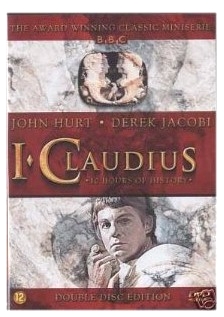 The series spans the history of the Roman Empire from Augustus to Claudius, a stuttering scholar who plays the fool and fools everyone. The latter became a career defining role for Derek Jacobi. As the depraved Caligula, whose reign of terror paves the way for Claudius, John Hurt eats every piece of scenery not tied down and is decadence personified. Equally remarkable and playing her part with a bite worse than any cobra or tarantula is BAFTA winner Siân Phillips as the lethal Livia. Brian Blessed, Patrick Stewart, and Margaret Tyzack co-star.
The series spans the history of the Roman Empire from Augustus to Claudius, a stuttering scholar who plays the fool and fools everyone. The latter became a career defining role for Derek Jacobi. As the depraved Caligula, whose reign of terror paves the way for Claudius, John Hurt eats every piece of scenery not tied down and is decadence personified. Equally remarkable and playing her part with a bite worse than any cobra or tarantula is BAFTA winner Siân Phillips as the lethal Livia. Brian Blessed, Patrick Stewart, and Margaret Tyzack co-star.
Included are an eight-page booklet with an article on the series' historical accuracy; extended versions of the first episodes; interview with Jacobi
; and the docs I, Claudius: A Television Epic, a behind-the-scenes look at the series, and The Epic That Never Was, recounting the failed 1937 film adaptation.
Available for Download and Soon on CD
Julie Andrews and Carol Burnett joined forces for several nights, taped for telecast on CBS. The live recordings Julie & Carol: Live at Carnegie Hall and Julie & Carol: Live at Lincoln Center, meticulously remastered, are available for the first time for digital DL and soon [May 8] in a two CD set [Masterworks Broadway/Broadway Legends series]. Andrews' exquisite soprano and spot-on comic timing, Burnett's full-throated musicality and no-holds-barred humor, and Mike Nichols' witty script combined to enthrall audiences.
Andrews had starred My Fair Lady and Camelot; Burnett, already a TV legend, in Once Upon a Mattress. Highlights include the comedy duet "You're So London," Andrews' rendition of "Oh Dear What Can the Matter Be," Burnett's "Meantime," production numbers, and a medley that brought the houses down, "History of Musical Comedy," with tunes from early 20th century to West Side Story.
Nearly a decade later, December 1971, CBS staged a reunion at Lincoln Center for live broadcast, including an even more ambitious medley, "Medley of the 60's, " 46 songs of the era packs in a mere 13 minutes; and a virtuoso, hilarious musical-jealousy number "Girls in the Band."
Liza Minnelli Live at the Winter Garden [Masterworks Broadway/Broadway Legends series] is just out and for the first time on CD, derived from the 1974 master engineered by Phil Ramone. There are 17 tracks, beginning with the a career arc overture and including "It Had to be You," "My Shining Hour" and "Cabaret."
Summertime and the Living's Easy
On May 9 Jazz at Lincoln Center will be swinging to a samba beat as Grammy-winning Orpheus Chamber Orchestra presents Bach to Brazil, with singer/songwriter Ivan Lins, percussionist Cyro Baptista, and guitarist/composers Juarez Moreira and Chico Pinheiro. Tkts are $29-$80 and available at JALC box office starting April 11.
Summer living just got easier with Arts America's comprehensive new website guide to everything cultural. It has links to 2,000+ museums and performing arts organizations in 99 cities. The Home Page features a tab for major summer festivals. There's info on handicapped access, hours, and discounts. Site genres are Theater, Classical Music, Dance, Jazz, Opera, College Arts, Museums, and Outdoor Venues. Follow on Facebook and Twitter or visit www.artsamerica.org.
So Long, Farewell
BroadwayStars publisher James Marino soon will be launching a site revamp without benefit of in-house columns. Since 2001, I've had the pleasure of watching BroadwayStars grow and evolve, and, in nearly 300 columns, do what I love doing. I'm indebted to James for the opportunity, and so many of you who've been supportive.
To quote and misquote Oscar Hammerstein: "So long, farewell...Auf Wiedersehen ... I hate to go and leave this site ... To you and you and you ... I'd like to say ... So long, farewell, auf Weidersehen ..."
It's not goodbye for we'll be meeting again, sooner than you think.
In closing, support the law banning cell phones and digital anything from theatres! And with Bway going beserk on show start times - 7p on Tuesdays expanding to Wednesdays and Thursdays; and some shows with a 7:30 curtain, it might appear 8:00 curtains are riding into the sunset. And what's this Off Bway trend of 3 on Saturday and 2 on Sunday? That's right, keep confusing us!
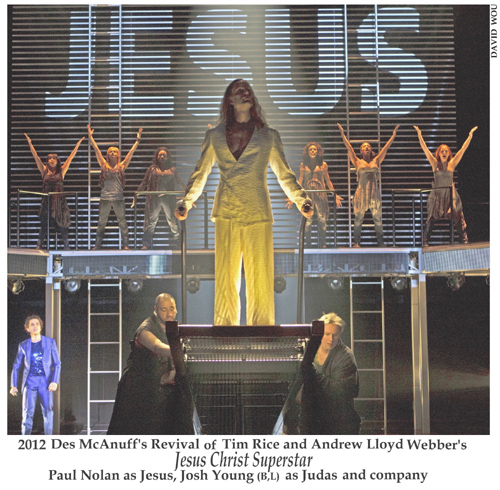 Rock Opera
Rock Opera 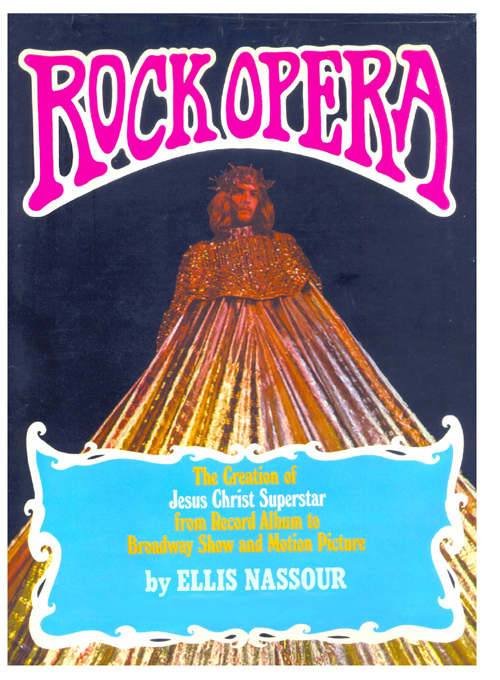 As the demos
As the demos 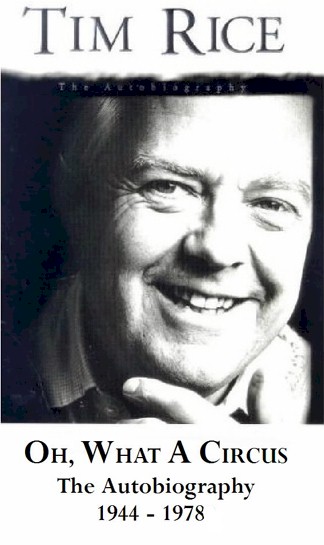
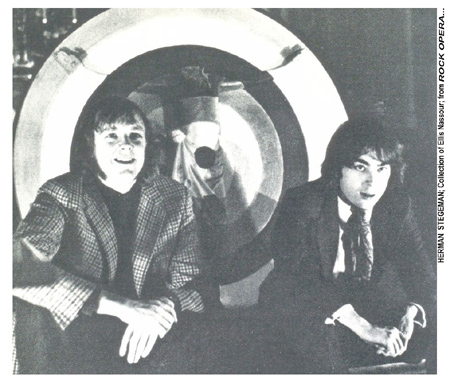 He flipped for the idea. According to Webber, "It was agreed that we'd first send up a flag to see whether the public would accept our approach." Then, in a bit of bravado and due to Brolly's enthusiasm, MCA commissioned the composition, gave Rice and Webber the go ahead and an advance.
He flipped for the idea. According to Webber, "It was agreed that we'd first send up a flag to see whether the public would accept our approach." Then, in a bit of bravado and due to Brolly's enthusiasm, MCA commissioned the composition, gave Rice and Webber the go ahead and an advance.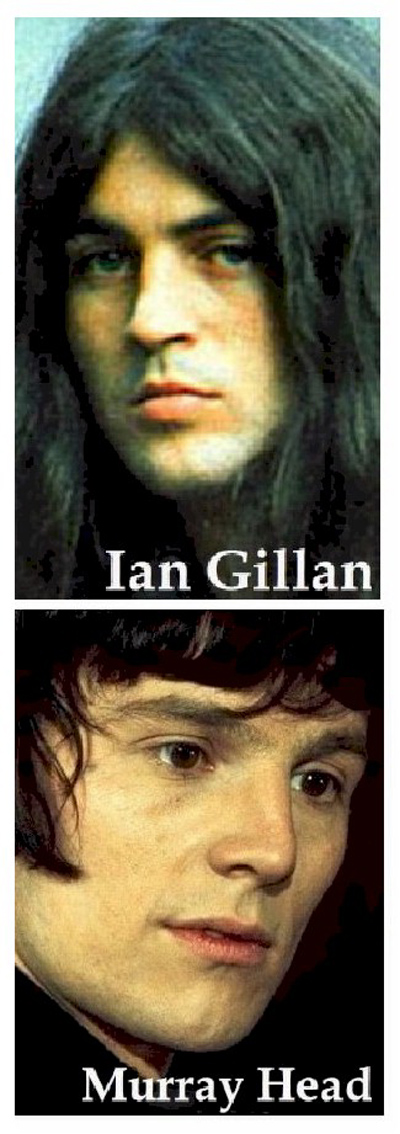
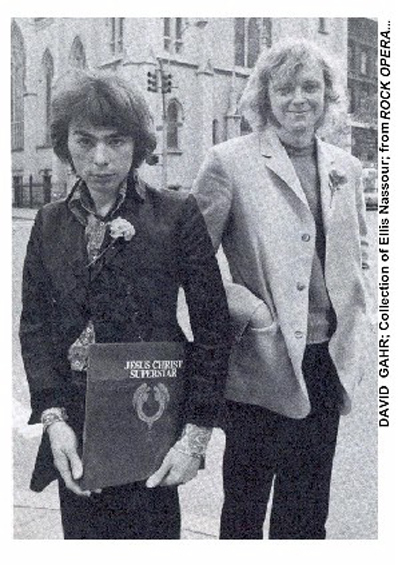 It was decided the English jacket art work was too garish and a new design was initiated for the U.S....Almost a year after the release of the single, the day of the album unveiling in the U.S. arrived. It was to be held in Decca's West 57th Street recording studios. Then VP Milt Gabler wondered out loud at a meeting: "Wouldn't it be great if the premiere could be held in a church?"
It was decided the English jacket art work was too garish and a new design was initiated for the U.S....Almost a year after the release of the single, the day of the album unveiling in the U.S. arrived. It was to be held in Decca's West 57th Street recording studios. Then VP Milt Gabler wondered out loud at a meeting: "Wouldn't it be great if the premiere could be held in a church?"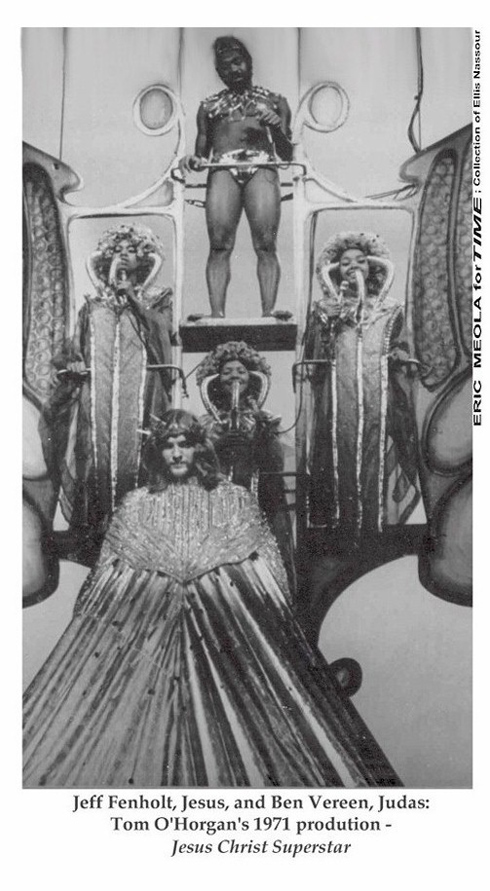
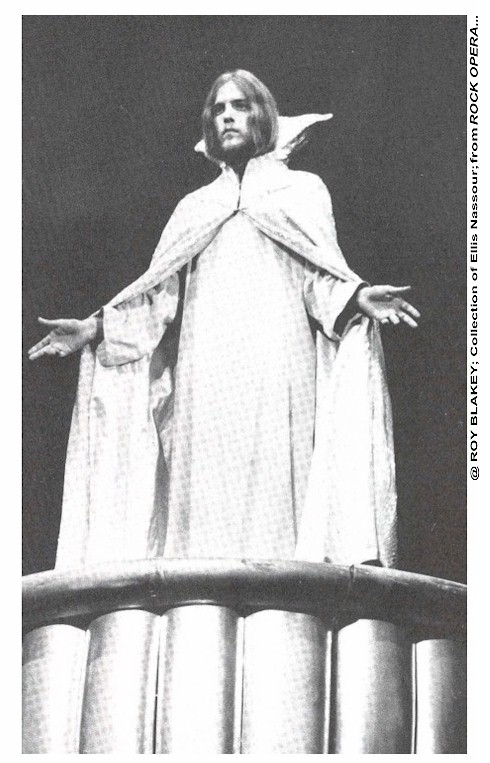
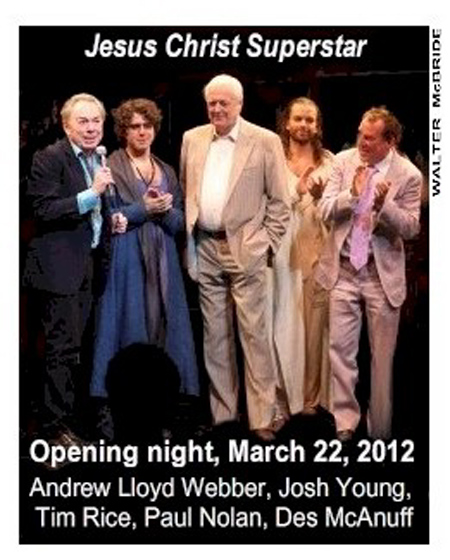 October 12, 1971, Jesus Christ Superstar had a star-studded opening, complete with massive street protests. It played 711 performances and 13 previews; and was nominated for five Tony Awards, including Lighting, Costumes [by the brilliant Randy Barcelo] and Scenic Design. Sound was not a candidate, since no Tony category existed for sound [a sad state that continued until the American Theatre Wing created one in 2007].
October 12, 1971, Jesus Christ Superstar had a star-studded opening, complete with massive street protests. It played 711 performances and 13 previews; and was nominated for five Tony Awards, including Lighting, Costumes [by the brilliant Randy Barcelo] and Scenic Design. Sound was not a candidate, since no Tony category existed for sound [a sad state that continued until the American Theatre Wing created one in 2007]. 